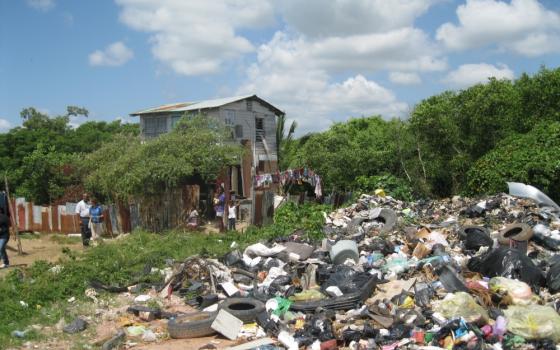I had been living in Belize for only three months and had known Teresa for only two when I got the phone call: Her oldest son was in the hospital, and could I please come right away to be with them? I hopped on my bike and with some trepidation pedaled toward the hospital I had managed to avoid visiting until now: the understaffed and overcrowded public hospital which had the reputation (probably exaggerated) of turning out as many people dead as alive.
I found them in a small room in the emergency wing. Teresa’s son, 12 years old, lay unconscious in the bed; she sat beside him, crying. I sat beside her and took her hand, and she began to speak. At first, I noticed her immediate panic and her search for meaning in her son’s sudden illness. As she continued to talk, though, I became aware of a deeper pain, a weariness caused by the daily struggle of a life of poverty.
She spoke of providing for her children as a single mother, working the night shift and returning home just in time to get the kids ready for school. She spoke of nearly passing out at work from pain but not taking the day off for fear of losing the minimum-wage job that provided the family’s only income. She told me that her bike was a prized possession because it allowed her to get to and from work. She smiled as she spoke of this oldest son, of his spunk and maturity, and her smile again turned to tears as she gazed at him lying unconscious in the bed.
I visited frequently in the coming days. Each time, the weight of Teresa’s pain settled a little deeper into me. As conversation flowed into prayer, the tight, self-centered nervousness in my chest dissolved and was replaced with a more acute and yet somehow expansive sensation, an ache deep in my belly. It was an ache of outrage and confusion, of longing and powerlessness. It was the ache of knowing her son would be getting the care he needed if he were at the private hospital across town. It was the ache of standing in the middle of injustice. Yet even as I ached for my friend, I knew it was only a shadow of the pain she felt.
Two weeks later, Teresa’s son died.
I thought of her recently when I learned that the Hebrew word for compassion, “racham,” comes from the root word “rechem,” or womb. It indicates a trembling of the womb in response to another’s suffering. Similarly, in Greek, compassion (splagchnizomai) translates to “being moved in one’s innermost parts.”
A stirring of the womb, being moved in one’s innermost parts. This quite literally describes the feeling I had in the hospital during those days, and it gives me new insight into the compassion of God. If my insides stirred for my friend as she ached for her son, how much more does God’s womb, from which we were all born, tremble for the suffering of our world?
Scripture is simply bursting with images of a compassionate God! Just think of the parable of the Good Samaritan, the passage from Isaiah about God gathering us to God’s bosom, or the stories in which Jesus is “moved with compassion” (Mk 6:34 and Mt 20:34, to name a few). Even when we aren’t explicitly told that Jesus felt compassion, we know by his actions that he did: He responds in love by listening to people, asking what their needs are, and often healing them.
As Jesus shows us, and as the Hebrew and Greek words demonstrate, movement is central to compassion. The verb-laden definitions are evidence of this: deep stirring, trembling, being moved. Ideally, this internal movement propels us into action. Compassion pulls us into greater communion with our suffering brothers and sisters.
As I reflect on the call to compassion in today’s world, I am increasingly convinced that perhaps the most overlooked voice crying out for compassion is that of Earth, the very Earth which we archetypally call our Mother. It’s not just humans who are suffering these days, but we seem to have forgotten that, as Thomas Merton wrote, “The whole idea of compassion is based on a keen awareness of the interdependence of all living beings, which are all part of one another and all involved in one another.”
Theoretically we believe this. We speak of the integrity of creation and the sanctity of all life. We say that God created all things and found them all good. Yet somehow we have missed the point. Nations are sinking, species are dying, children are living on landfills, and the richest 20 percent of the world’s population consumes 86 percent of the world’s resources. We operate under a worldview that places humans above and outside of “nature,” a thought that would be unfathomable for the ancient Hebrews, who had no concept or word for “nature” independent from humanity.
As Teresa cried for her suffering child, I believe that God cries for the suffering children of Earth, human and otherwise. In a world where the consequences of our consumption are easily obfuscated and convenience is justified at all costs, it is sometimes very difficult to choose compassion. I often feel as helpless as I did that day in the hospital room. What can I do?
I can start by listening, and in listening I can allow myself to be moved. I may never feel the stirring of a child in my womb, but I pray that I will always feel the inner stirring of compassion and be moved to respond in love.
[Christin Tomy is a novice with the Dominican Sisters of Sinsinawa, Wisconsin. She has lived and worked in Central and South America and has a background in Spanish and social work. She is passionate about social justice, good hugs, Iowa and most outdoor activities. She also writes for her community’s blog at catherinescafe.blogspot.com.]

